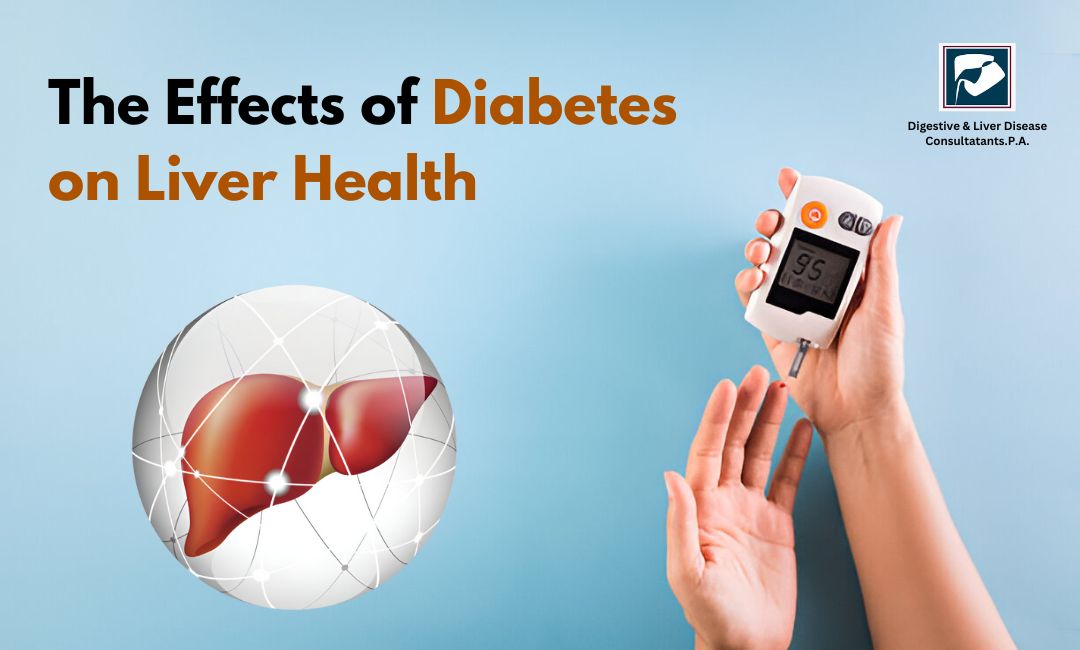Diabetes is a condition that affects millions of people worldwide, impacting how the body processes blood sugar (glucose). While most people associate diabetes with complications like heart disease, kidney problems, or nerve damage, its effects on the liver are often overlooked. However, the liver plays a crucial role in managing blood sugar levels, and when diabetes is not well controlled, it can lead to serious liver conditions.
At Digestive & Liver Disease Consultants, P.A., we specialize in diagnosing and treating liver diseases, including those related to diabetes. In this blog, we’ll explore how diabetes affects liver health, the risks involved, and how to protect your liver if you have diabetes.
Understanding the Link Between Diabetes and Liver Health
The liver is a vital organ responsible for processing nutrients, detoxifying harmful substances, and regulating blood sugar levels. It stores and releases glucose as needed to keep blood sugar levels stable. However, in people with diabetes, insulin resistance and high blood sugar levels put extra stress on the liver, increasing the risk of various liver diseases.
The key ways diabetes impacts the liver include:
Increased Fat Buildup (Fatty Liver Disease)
- One of the most common liver conditions in people with diabetes is non-alcoholic fatty liver disease (NAFLD).
- NAFLD occurs when excess fat accumulates in liver cells, leading to inflammation and damage.
- If left untreated, NAFLD can progress to non-alcoholic steatohepatitis (NASH), which causes liver scarring (fibrosis) and increases the risk of cirrhosis or liver failure.
Higher Risk of Liver Fibrosis and Cirrhosis
- Chronic high blood sugar levels can contribute to liver fibrosis, which is the formation of scar tissue in the liver.
- Over time, fibrosis can worsen, leading to cirrhosis, a severe condition where liver function is significantly impaired.
Greater Chance of Liver Cancer
- People with diabetes and liver disease have a higher risk of developing hepatocellular carcinoma (HCC), the most common type of liver cancer.
- Fat accumulation, chronic inflammation, and fibrosis all increase the likelihood of cancerous cell growth in the liver.
Increased Risk of Hepatitis and Other Liver Infections
Diabetes can weaken the immune system, making the body more susceptible to infections, including hepatitis B and C, which can further damage the liver.
Signs and Symptoms of Liver Disease in Diabetic Patients
Liver disease often progresses silently, meaning symptoms may not appear until the condition is advanced. However, some warning signs to look out for include:
- Fatigue and weakness
- Unexplained weight loss
- Jaundice (yellowing of the skin and eyes)
- Swelling in the legs and abdomen (due to fluid buildup)
- Dark-coloured urine and pale stools
- Persistent nausea or loss of appetite
- Right upper abdominal pain or discomfort
If you have diabetes and notice any of these symptoms, it’s important to consult a liver specialist as soon as possible.
How to Protect Your Liver if You Have Diabetes
While diabetes increases the risk of liver disease, there are steps you can take to keep your liver healthy:
1. Maintain Healthy Blood Sugar Levels
Keep your blood sugar within the target range recommended by your doctor.
Monitor your glucose levels regularly and take diabetes medications as prescribed.
2. Eat a Liver-Friendly Diet
Focus on a balanced diet rich in fruits, vegetables, lean proteins, and whole grains.
Reduce consumption of processed foods, refined sugars, and saturated fats.
Include fiber-rich foods like legumes, nuts, and leafy greens to help regulate blood sugar and reduce fat buildup in the liver.
3. Maintain a Healthy Weight
Excess body weight contributes to both insulin resistance and fatty liver disease.
Aim for a gradual, sustainable weight loss if overweight. Even losing 5-10% of body weight can significantly improve liver health.
4. Exercise Regularly
Engage in at least 150 minutes of moderate-intensity exercise per week, such as brisk walking, cycling, or swimming.
Physical activity helps regulate blood sugar, reduce liver fat, and improve insulin sensitivity.
5. Limit Alcohol Intake
Alcohol can further damage the liver, especially in people with diabetes and fatty liver disease.
If you drink, do so in moderation, or avoid alcohol altogether if you already have liver disease.
6. Get Regular Liver Check-Ups
People with diabetes should have regular liver function tests and screenings for fatty liver disease.
Early detection can help prevent serious complications.
Why Choose Digestive & Liver Disease Consultants, P.A.?
At Digestive & Liver Disease Consultants, P.A., our team of experienced gastroenterologists and hepatologists specializes in diagnosing and treating liver conditions, including those linked to diabetes. We provide:
- Comprehensive liver evaluations
- Advanced diagnostic tools for detecting fatty liver disease, fibrosis, and cirrhosis
- Personalized treatment plans to help manage diabetes-related liver issues
- Nutritional and lifestyle guidance to protect and improve liver health
Our mission is to help patients take control of their liver health and prevent long-term complications. If you have diabetes and are concerned about your liver, we are here to help.
Conclusion
Diabetes and liver health are closely connected. Uncontrolled diabetes increases the risk of fatty liver disease, fibrosis, cirrhosis, and even liver cancer. However, by managing blood sugar levels, maintaining a healthy diet, exercising, and getting regular check-ups, you can protect your liver from serious damage.
If you are concerned about your liver health, schedule an appointment with Digestive & Liver Disease Consultants, P.A. today. Your liver is essential—take care of it!






